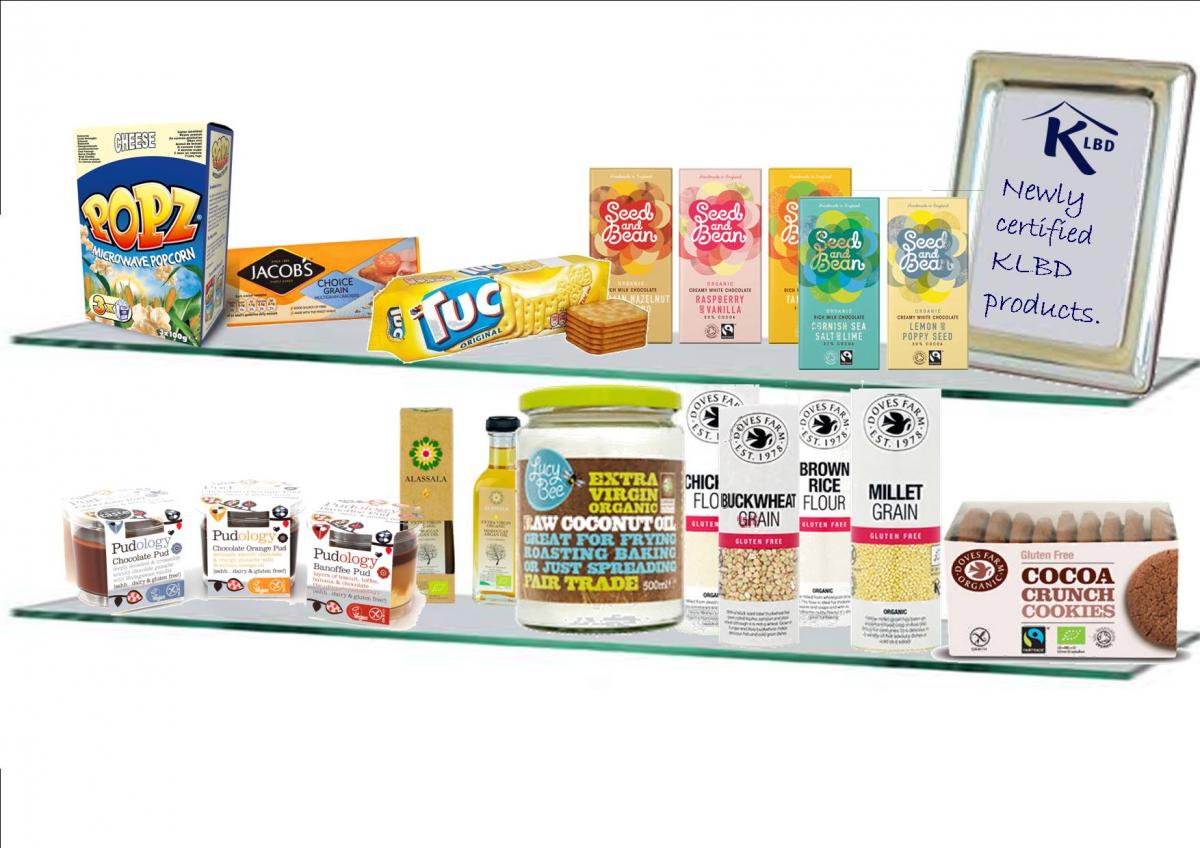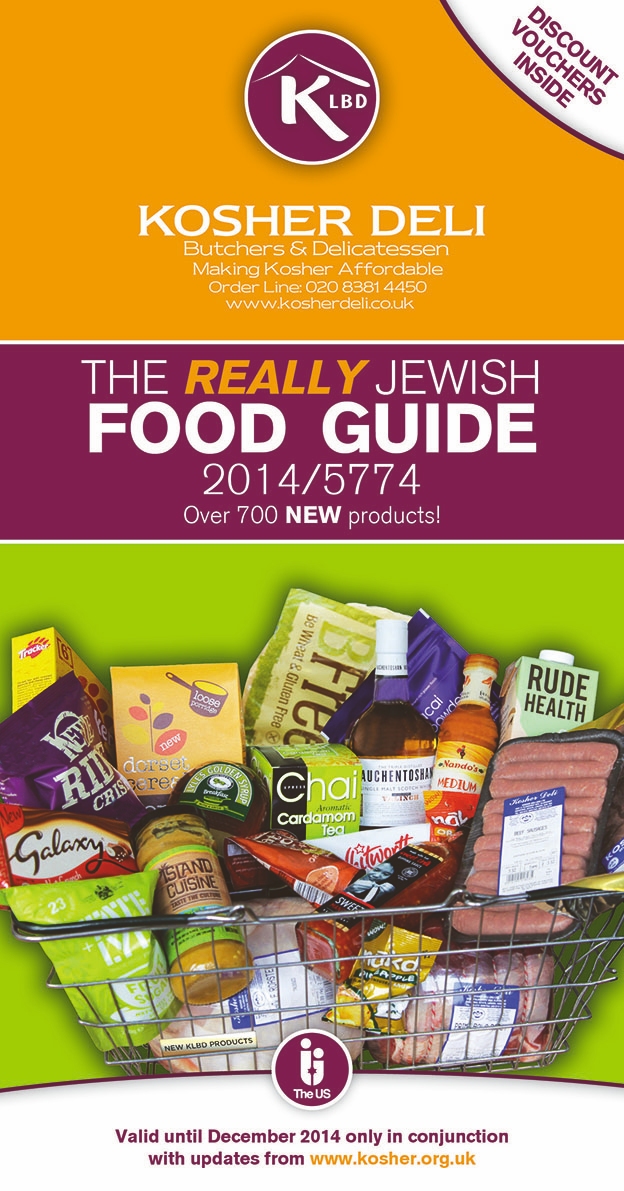Imagine if you, the kosher consumer, could buy the majority of your kosher groceries in the local store or supermarket anywhere in the UK!

Some of the new items recently given the kosher seal of approval
Well the KLBD, the London Beth Din Kashrut Division, is making significant progress towards just that goal by kosher certifying regular, household brands of food and drink. This not only makes buying kosher more convenient and accessible, but it makes it more affordable too.
How does kosher certification work? The KLBD collaborates with food and drink manufacturers to provide the Jewish public with products that are guaranteed to be kosher. The company provides details of the ingredients used in each product to be certified, including any processing aids, even those that do not have to be declared on the label. They inform the KLBD of all suppliers of every ingredient, so that the team can check that these ingredients are made exclusively from kosher raw materials on production lines that handle only kosher products. In some cases it may be necessary for manufacturers to switch suppliers of ingredients to ensure that they are coming from a kosher source. Certain types of ingredients, such as vegetable fats and emulsifiers can only be accepted if they themselves are kosher certified either by the KLBD or by another reliable kashrut authority.
Once it has been established that all the ingredients are kosher compliant then a factory visit will be arranged so that one of the KLBD team of highly qualified kashrut inspectors can verify that the production lines are kosher and that there is no crossover or contamination with non-kosher materials.
The manufacturer enters into a legally binding contract with the KLBD, the terms of which prohibit any changes to the production or ingredients without prior approval from the KLBD, and a Kosher Certificate is issued. A certified company is entitled to print the KLBD kosher logo on all of their certified products. This makes it easier for the public to identify them on the shelves. Whilst the KLBD would always promote the benefits of using the kosher logo, the final decision rests with the company and some prefer not to feature the logo on their packaging.
The ever growing list of kosher certified products includes Baby Milks, Bread, Edible Cake Decorations, Food Colourings, Snack Bars, Cereals, Confectionery, Crackers & Crispbreads, Crisps & Snacks, Dairy Free Cheese, Milk, Ice Cream & Yoghurts, Energy Drinks & Bars, Fruit Snacks, Gluten Free Biscuits, Cakes, Bread, Rolls & Wraps, Health Foods, Herbal Teas, Ice Creams, Nuts, Vegetable Oil, Popcorn, Rice Cakes, Condiments, Sugar, Sweeteners, Syrups & Toppings, Soy Sauce, Beer, Gin, Liqueurs, Whisky, Medicines and Kitchen Detergents.
But what about products that are not kosher certified? In order to advise the public about regular brands which, although not kosher certified, are still acceptable for use, the KLBD Food Technology Team researches thousands of products by speaking with and emailing manufacturers to check all the ingredients, processing aids and manufacturing conditions. Based on the information received and confirmed in writing, products can often be kosher approved. Similarly, the KLBD pharmacist researches and checks thousands of medicines that are approved as kosher. Whilst a fee is charged to companies seeking KLBD certification, no charge is made for product approvals and the listing of such products in the Guide, and indeed the whole research and product information project is highly acclaimed as an important communal service provided by the United Synagogue.
Whilst the research into approved products is meticulous, it should be pointed out that, due to the higher level of accountability of kosher certified companies, it is always preferable to buy kosher certified products if possible.
So how can the kosher consumer find out which UK products are kosher certified or approved, especially if there is no kosher logo on the packaging? The KLBD produces two annual publications: The Really Jewish Food Guide** which comes out in January and the Kosher Nosh Guide (also available for download as an online flipbook*) which comes out in the summer and is designed with schools, nurseries, students and youth organisations in mind, so that they will know what nosh is kosher for the long summer holidays!
Kashrut information is easily accessible online by using the free Kosher Product Search* or downloading the UK Really Jewish Food Guide app*, which is suitable for all smart phones.
The consumer needs to be aware that manufacturers constantly change their range of products and modify their recipes, so the kosher status of products is subject to change. In addition, newly certified and approved products become available. It is therefore important to keep up to date with the latest developments.
The KLBD publishes quarterly updates for use in conjunction with The Really Jewish Food Guide. The updates are cumulative, so only one update need be consulted at any time. Information added since the previous update is marked. The updates are available to download from the KLBD website*. There are a number of methods of accessing notifications about newly certified and approved products, kashrut alerts and quarterly kashrut updates. You can subscribe to free KLBD email alerts* or text alerts*. Alternatively you can receive notifications via the free Kosher London app*, Facebook* or Twitter*. If you have the UK Really Jewish Food Guide app you will automatically receive notifications.
If you have further questions, you can email* or call* the KLBD, send a photo query via the Kosher London app, Tweet your question or post it on the KLBD Facebook group.
* For full details of all KLBD services see Kashrut At Your Fingertips.
** The Really Jewish Food Guide may be purchased from Jewish book stores.

The Really Jewish Food Guide 2014/5774


